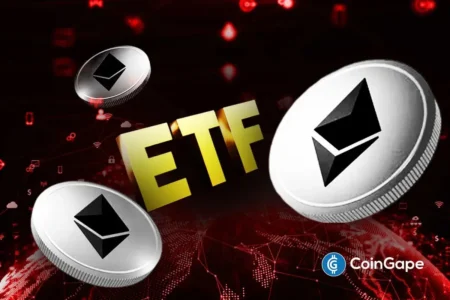SEC Acknowledges Staking Filing for BlackRock’s Ethereum ETF: A New Era for Cryptocurrency Investments
The US Securities and Exchange Commission (SEC) has made headlines by formally recognizing Nasdaq’s filing to enable staking for BlackRock’s Ethereum Exchange-Traded Fund (ETF). This pivotal acknowledgment is not just a regulatory nod—it initiates a public consultation that could reshape cryptocurrency investment strategies in the near future. As expert opinions converge on the potential for approval by the year’s end, stakeholders are paying close attention to how this development will influence Ethereum’s market dynamics and ETF offerings.
Understanding the SEC’s Acknowledgment
According to the SEC’s official documentation, the Commission has accepted Nasdaq’s proposal to incorporate staking capabilities into BlackRock’s Ethereum ETF. Staking allows investors to earn rewards by participating in Ethereum’s network operations, essentially locking up their coins in order to support blockchain activities. If the SEC gives this innovation the green light, the ETF could stake a portion of its Ethereum holdings, redistributing any earned rewards to its investors. This move not only adds a layer of potential profitability for investors but also aligns with evolving paradigms in cryptocurrency investment vehicle strategies.
Public Consultation Period: Impact on Stakeholders
In light of the SEC’s acknowledgment, a critical 21-day window has opened for interested parties to offer comments regarding the proposed changes. This public consultation is vital for ensuring that the regulatory body considers various perspectives before making a final decision. With the growing interest in staking, investors, analysts, and cryptocurrency enthusiasts are likely to flood the SEC with insights, concerns, and suggestions. The regulatory landscape surrounding cryptocurrencies is continuously evolving, and constructive feedback from the community plays a significant role in shaping its future.
Timeline of Approval
The SEC has a timeframe of up to 90 days to either approve or reject BlackRock’s application, or to extend the consideration period for further review. Mid-July saw Nasdaq filing for inclusion of staking, coinciding with indications that the SEC’s stance may be softening towards staking features. Industry insiders and financial analysts are optimistic that this shift could pave the way for a broader acceptance of crypto-related investment products, thereby fostering a healthier market environment. The potential approval of staking in BlackRock’s Ethereum ETF may signal a turning point for institutional involvement in cryptocurrency sectors.
The Importance of Staking in Cryptocurrency
Staking has emerged as a cornerstone feature in many cryptocurrency networks, particularly in Ethereum’s transition to a proof-of-stake (PoS) model. By allowing holders to earn rewards for supporting network functions—like validating transactions—staking makes cryptocurrencies more enticing for long-term investors. Integrating such features into an ETF could also attract novice investors who may prefer a more traditional investment approach while wanting to tap into cryptocurrencies. Through an ETF, retail and institutional investors alike would have easier access to the lucrative options that staking provides, thus potentially increasing overall market liquidity.
The Broader Implications for the Crypto Market
The potential approval of staking within BlackRock’s Ethereum ETF is likely to have broader implications for the cryptocurrency market. As major financial institutions like BlackRock take the plunge into staking, their involvement could lend much-needed credibility to the space, potentially influencing regulatory frameworks and public perception. Moreover, a successful staking model could lead to similar proposals and filings from other investment firms, fostering competition and innovation within the crypto asset landscape. The attention lent to a major player like BlackRock could also encourage more retail investments, which would further solidify the position of cryptocurrencies as viable investment avenues.
Conclusion: A Shifting Landscape
As this story continues to develop, the eventual outcome of the SEC’s decision on BlackRock’s staking application will undoubtedly be a pivotal moment for both traditional finance and the cryptocurrency market. The integration of staking into an Ethereum ETF could lead to a renaissance of interest and innovation in crypto investment products, emphasizing the need for robust regulatory frameworks that encourage growth while safeguarding investor interests. Stakeholders, from individual investors to institutional giants, will be keenly watching how regulatory actions unfold, setting a new precedent for the future of cryptocurrency investments.
















